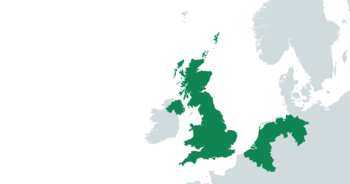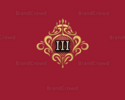Hanoverian Union
Hanoverian Union
| |||||
|---|---|---|---|---|---|
|
Flag | |||||
| Motto: "Unitas sub corona" (Latin) "Eenheid onder de kroon" (Dutch) "Eenheet ënner der Kroun" (Luxembourgish) "Unity under the Crown" | |||||
| Anthem: "The Anthem of Unity" | |||||
 | |||||
| Administrative center | Brussels | ||||
| Official languages | |||||
| Type | Politico-economic union | ||||
| Member states | |||||
| Leaders | |||||
| Alexandra | |||||
• Chairman | Jacqueline Smith | ||||
| Pieter Omtzigt | |||||
| Xavier Bettel | |||||
| The Baroness Hale of Richmond | |||||
| Legislature | Executive Council of the Hanoverian Union | ||||
| Establishment | |||||
| 6 December 1946 | |||||
| Area | |||||
• | 365,754.4 km2 (141,218.6 sq mi) | ||||
| Population | |||||
• 2022 estimate | 106,025,548 | ||||
• Density | 289.8/km2 (750.6/sq mi) | ||||
| GDP (PPP) | 2022 estimate | ||||
• Total | $6.025 trillion | ||||
• Per capita | $56,825 | ||||
| GDP (nominal) | 2022 estimate | ||||
• Total | $5.297 trillion | ||||
• Per capita | $49,959 | ||||
| Gini (2022) | low | ||||
| HDI (2021) | very high | ||||
| Currency | |||||
The Hanoverian Union, formally the Union of Hanoverian Nations, is a politico-economic union consisting of three neighbouring countries in Western Europe, namely the United Kingdom, the Netherlands, and Luxembourg, all three of which are constitutional monarchies with a single Hanoverian monarch as their respective head of state, currently Queen/Grand Duchess Alexandra. Formed in 1946 as a result of the Brussels Agreement between the governments of all three countries, the organisation mainly promotes intergovernmental cooperation between its member states, with the reigning Hanoverian monarch being promoted and seen as a common and unifying identity between the three countries. With an estimated total population of 106 million, the union covers a total area of approximately 365,754.4 km2 (141,218.6 sq mi) while collectively boasting an economy worth $6.025 trillion.
The organisation's agenda is mainly decided and legislated by a legislative body, known as the Executive Council, which is made up of approximately thirty members with approximately ten seats being allocated to each of the organisation's three member states, whom would appoint members from their national legislatures to take up their respective allocated seats. By tradition, the Executive Council convenes every five years, with each session seeing members of the legislative body voting to enact the organisation's seasonal agenda known as a "Trinational Plan".
Despite its similarities to the Commonwealth of Nations in which several members of the organisation share a common head of state with the United Kingdom, the Netherlands, and Luxembourg are generally considered to be distinct in status from the Commonwealth countries in that they are otherwise fully independent sovereign nations rather than former British colonies such as Canada, Australia, and New Zealand, despite sharing the same head of state. However, all three countries are members of the European Union.
Formation
The end of the Second World War in 1945, while not completely so, had inflicted considerable damage to the economies of the United Kingdom, the Netherlands, and Luxembourg, with towns and cities damaged by bombings from both sides and the lives of civilians lost to enemy gunfire. In response, during the first few post-war years, the British government under Clement Attlee, under the auspices of re-strengthening the personal union between the three countries, first proposed in 1946 the idea of a union between the three countries concerning political and economic matters. Initially, Attlee's proposal was met with some skepticism the Dutch and Luxembourgish governments who were concerned that given the clear difference in economic size between the United Kingdom and their respective countries, the former would therefore automatically become the sole dominant power in the organisation out of the three, thereby rendering the Netherlands and Luxembourg's participation ultimately useless and ineffective given their inferior status.
However, such worries were quickly calmed when, in devising a method for choosing the executive head of the organisation, Attlee proposed that the position should rotate between the three countries after a designated period of time, so as to give each member states an equal opportunity for the leadership spot. Soon enough, the British prime minister's revision on the project was met with satisfaction from the Dutch and Luxembourgish leaders, eventually culminating in the historic Brussels Agreement on 6 December 1946, in which Attlee, together with his Dutch and Luxembourgish counterparts Louis Beel and Pierre Dupong respectively, unanimously agreed on the final framework of what would later become known as the Hanoverian Union, with the name "Hanoverian" referring to the royal house from which the common monarch of all three countries originated.
Politics
As established by the Brussels Agreement in 1946, the Hanoverian Union consists of three distinct institutions, namely the Hanover Supreme Council, the Hanover Executive Council, and the Hanover Supreme Court. The organisation's ceremonial head is the President who is always the reigning monarch of all three countries, currently Queen Alexandra. Meanwhile, the organisation's executive head is the Chairman, currently Sigrid Kaag of Democrats 66.
The Hanover Supreme Council is the supreme decision-making body of the organisation tasked with implementing agendas agreed upon by the Executive Council. It is made up of approximately four individuals, namely the President, Chairman, Deputy Chairman, and the Secretary-General. Together, they are collectively referred to as "The Supreme Council" or "The Cabinet" and are based at the Palace of Laeken which is alternatively known as the "Supreme Palace".
Meanwhile, the Hanover Executive Council is the organisation's legislative body, similar to that of a parliament in many countries. Although general elections are not held to elect its members, each of the three member states reserves the right to appoint their own parliamentarians to fill each of the ten out of thirty seats given to them. The Executive Council is primarily tasked with legislating and passing the organisation's official agenda, which is normally done every five years, although, unforeseen circumstances have otherwise led to this trend being broken on certain occasions, with the Executive Council sometimes passing a new agenda or amending the previous one well ahead of the five-year deadline if deemed necessary but only with a vote of two-thirds of parliamentarians during a special session. It is based at the Royal Palace of Brussels (alternatively dubbed "Parliament Palace"), which is also the seat of the President, where parliamentarians usually convene.
Lastly, the third institution is the Hanover Supreme Court, the organisation's supreme judicial body. Although mainly tasked with interpreting any agendas passed in order to ensure its compliance with existing laws and regulations, the court also hears and rules on trials involving any alleged offences committed by any members of the organisation. Moreover, as the supreme judicial body, it also hears appeals from the Hanover General Court, the second and lower court that together with the Hanover Supreme Court forms the organisation's judicial branch. Both courts are made up of approximately six justices and are respectively led by an appointed chief justice namely The Baroness Hale of Richmond for the Hanover Supreme Court and Nelly Helminger for the Hanover General Court. Both courts are based at the Belvédère Château which, given its status, is popularly dubbed "The Château of Justice".
Economy
Collectively, the organisation boasts a total GDP of $6.025 trillion. In terms of division, the United Kingdom possesses the lion's share of the organisation's economy, representing about 66.5% of its total GDP, followed by the Netherlands at 33.4%, and Luxembourg with the remaining 0.1%. On a per capita basis, an average citizen makes around $56,825 monthly, an amount roughly equal to that of a citizen of the larger European Union.
Shortly after its foundation, it was initially proposed that all three of its member states should adopt a common currency in order to simplify economic activities and trade between themselves. However, such an idea never gained popular support, especially in the United Kingdom where popular opposition against the replacement of the longstanding pound sterling in favour of an entirely new currency ultimately led to the idea being shelved and never proposed again in the future. Nonetheless, all three countries are currently members of the larger European Union, although, out of the three, only the United Kingdom has consistently remained with its currency, the pound sterling, whereas both the Netherlands and Luxembourg have adopted the euro currency. Likewise, both the Netherlands and Luxembourg are members of both the Eurozone and the Schengen Area whereas the United Kingdom is not for both cases.
Despite the disparity in economic sizes and currencies, all three countries are commonly associated with a mixed-market economy, with each of them generally possessing a diverse mix of industries including services, healthcare, finance, and manufacturing. Moreover, all three member states also have capital cities that are of considerable importance to Europe with London being a major financial center, Amsterdam possessing one of the busiest ports in Europe, and Luxembourg City being one of the de facto capitals of the European Union whose institutions are also located in the city including the Court of Justice of the European Union, European Court of Auditors, and the European Investment Fund.
Military
While the organisation does not officially have a unified armed force, member states routinely participate in military drills with each other via their common membership of NATO, namely through war games such as Exercise Joint Warrior and Exercise Frisian Flag.
As of current, member states generally possess high-end and advanced equipment and vehicles including the Challenger 2 and Leopard 2 main battle tanks, two Queen Elizabeth-class aircraft carriers, as well as Eurofighter Typhoon and F-35 Lightning II fighter jets. As a landlocked country, Luxembourg does not have a navy unlike the United Kingdom and the Netherlands.
Out of the three, only the United Kingdom is a recognised nuclear power. However, none of the member states have officially ratified or are a party to the United Nations' Treaty on the Prohibition of Nuclear Weapons.
Language
Officially, the organisation recognises three languages as its official working languages, namely English, Dutch, and Luxembourgish. However, it is generally a common practice for English to be used on most occasions, owing to its wider popularity compared to the other two languages.
Nonetheless, despite English being the preferred language, official documents are always printed in all three languages with the English version always being accompanied by its Dutch and Luxembourgish translations.
Demographics
In total, the organisation has a population of around 106 million people, the majority of which reside in the United Kingdom, followed by those in the Netherlands, and lastly, those living in Luxembourg.
In addition, all three member states are Christian-majority countries with a significant non-religious minority.
